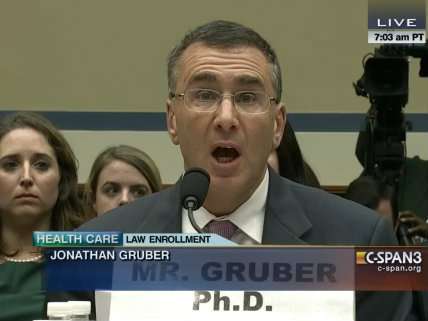Jonathan Gruber's Weak New Excuse for His Obamacare Exchange Subsidies "Speak-O"

At a hearing in front of the House Oversight Committee this morning, MIT economist and Obamacare Architect Jonathan Gruber attempted to explain away recently unearthed comments about the Affordable Care Act's subsidies that could prove troublesome for the health law as it heads to the Supreme Court again next year. But his new explanation doesn't make much sense.
To understand today's testimony, you have to go back to a video taken in January 2012. The video shows Gruber at a conference, where he's asked about what would happen if states declined to establish health insurance exchanges under Obamacare. Gruber says in the video that "what's important to remember politically about this is if you're a state and you don't set up an exchange, that means your citizens don't get their tax credits."
This line was something of a bombshell when it was discovered this summer, because it showed Gruber, one of the most influential and widely quoted Obamacare experts, clearly saying exactly what the challengers in a series high-profile suits against the administration's implementation of the health law have argued: that, despite the Internal Revenue Service decision to allow health insurance tax credits to flow through either federal or state-run exchanges, the plain text of the law only allows for tax credits (subsidies) in state-established exchanges. The challenge was recently accepted by the Supreme Court, further raising the prominence of the remarks.
When this remark initially surfaced over the summer, Gruber described it as a "speak-o," the verbal equivalent of a typo. But that was hard to believe given that Gruber elaborated on it at length, and given that another recorded remarked quickly surfaced in which Gruber said almost exactly the same thing. The recordings strongly suggested that he meant to say what he said, and that he knew what the implications were.
In today's testimony, Gruber offered a new explanation, saying that what he meant when he made the remarks in 2012 was that he wasn't confident the federal government would set up an exchange; if the federal government didn't build a fallback, then that would mean that states choosing not to build their own would lose access to tax credits. In the prepared version of his testimony, he puts it like this: "The point I believe I was making was about the possibility that the federal government, for whatever reason, might not create a federal exchange."
For several reasons, it's difficult to buy this updated explanation. For one thing, it conveniently ignores the question Gruber was asked in that January 2012 presentation, which was about the establishment of exchanges. "It is my understanding that if states don't provide them," the questioner says, "then the federal government will provide them for the states."
In his response, Gruber doesn't dispute this at all. In fact, he opens his response by saying, "yeah," in agreement with the questioner. He does mention that the federal government has slow-walked the creation of its exchange, perhaps in order to encourage states to set up their own, but he doesn't once raise the possibility that the federal fallback won't exist at all. Instead, he talks only about the consequences of states declining to establish their own exchanges, not the consequence of what might happen if states decline and the federal government also fails to create an exchange.
Nor does he raise the possibility that the federal government might fail to set up an exchange in the other recording. In that recorded speech, he says that "if your governor doesn't set up an exchange, you're losing hundreds of millions of dollars of tax credits to be delivered to your citizens." Again, he's not saying, "if your governor doesn't set up the exchange and the federal government also doesn't set up an exchange." He's just saying that this is the result of a state not building its own exchange.
Gruber's suggestion that he was thinking that the federal government might fail to create an exchange is also odd given that the federal government is required by law to do so if a state does not. Asked about this requirement today by Rep. Justin Amash (R-Mich.), Gruber claimed not to recall the exact details of what the law entails. That's tough to believe given that Gruber spent years as a high-profile, well-paid consultant to states considering setting up their own exchanges. But even if he does not remember the details now, it is even harder to believe that Gruber did not know about this requirement back in 2012, when he was in the midst of exchange-related consulting work for multiple states.
Finally, Gruber admitted that he has come up with this explanation for what he must have been trying to say entirely after the fact. While "thinking about how I could have made that statement, I believe that's what I had in mind," he said today. This is an explicit admission that he's rationalizing his prior statement in order to fit with what he now believes.
Gruber's appearance before the committee came after numerous additional videos surfaced this fall in which Gruber suggested that the process leading to the passage of Obamacare was not transparent. In those videos he said that the law relied on a convoluted structure to confuse the public about how it worked, and was written in a "tortured" way to achieve a desirable score from the Congressional Budget Office. His appearance was a kind of penance and public shaming, and he repeatedly attempted to distance himself from those remarks. Instead what he ended up proving was that he could torture his own remarks too.


Show Comments (173)